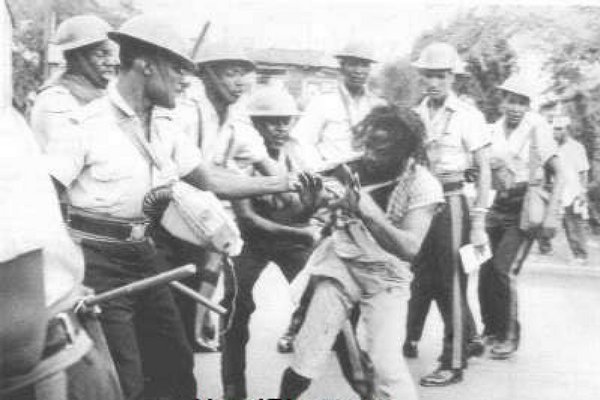For years there was animosity between Rastafarians or Rastafari also known as Rastas and the British colonial government in Jamaica. That mistrust would continue even after independence on August 6, 1962.
The political establishment feared the Rastafari were the most potent to overthrow a government, and under the guise of illegal cannabis arbitrarily beat, injure, jail and even killed people from that stock at will.
Even famous musicians including Peter Tosh and Bob Marley suffered police brutality for their weed use, which Rastas use as a religious sacrament, as well as, their campaigns for more to be done for the Jamaican citizenry. Tosh was so brutally beaten on one occasion by the Jamaican police he was only a whisker away from death. He had to self-isolate for nearly six years to heal before returning to social life.
The 1963 Coral Gardens massacre was another episode in the torrid relationship between Jamaican security forces and the Rastafari community.
Reports indicate a Rastafarian sympathizer, Rudolf Franklin, was shot and seriously injured by a property owner in a dispute over lands. Coral Gardens was part of a larger property; the Rose Hall as well as the Rose Hall mansion. The property was the site of small-scale farming by Rastafarians, but the landlords and government officials wanted to convert the area into a tourist destination.
The government and landlords viewed the Rastafari as an obstacle to their goal of re-purposing the property for tourism, and frequently sent police to evict them. In one such incident in 1961, police attacked Rudolph Franklyn, shooting him six times in the stomach and leaving him for dead on his farm. Franklyn received plastic surgery in a hospital to repair his stomach, but was reportedly told by a doctor that once the plastic “rotted”, his wounds would reopen and he would die.
Having gone through this injustice should have been enough, but Franklyn was immediately arrested after the surgery on the grounds of cannabis possession and sentenced to six months in prison.
Angry for having to endure being shot at multiple times as well as jailed for no just cause, Franklyn sought revenge upon his release from prison, with his sights on Edward Fowler, the overseer who had attempted to evict him.
Franklin and others decided to exact revenge by burning down the Ken Douglas Shell service station at Coral Gardens. That incident caused a massive state crackdown against Rastas. Three Rastas, three other civilians and two policemen died including Rudolph Franklin and Edward Fowler.
More than 150 ‘beard men’ were rounded up and arrested on the orders of the prime minister, Sir Alexander Bustamante, who went to St James with the commissioner of police and head of the Jamaica Defence Force in addition to a strong detachment of police from neighboring parishes who were dispatched to Coral Gardens and surrounding areas.

As at 2017, Prime Minister Andrew Holness officially apologized to the Rastafari community for the atrocities committed against members of that movement in the 1963 Coral Gardens massacre.
In a statement to Parliament, Holness acknowledged that the Coral Gardens incident had been a source of pain and hurt for the Rastafari community. “The Coral Gardens incident was a grave injustice,” he stressed.
The Holness government also established a trust fund of $10 million to assist the beneficiaries of those who suffered loss during the “repressive” incident.
The Government also set aside six lots at Pinnacle in St Catherine as protected heritage sites.










